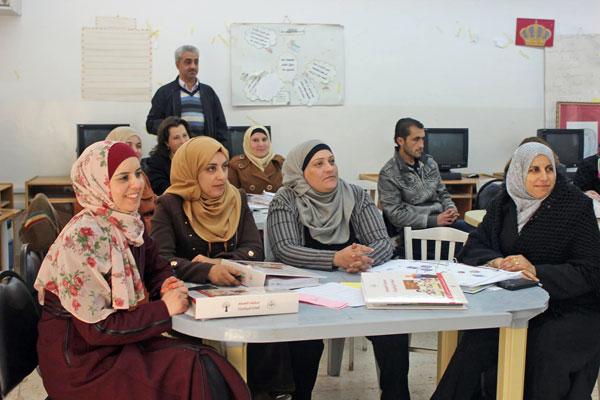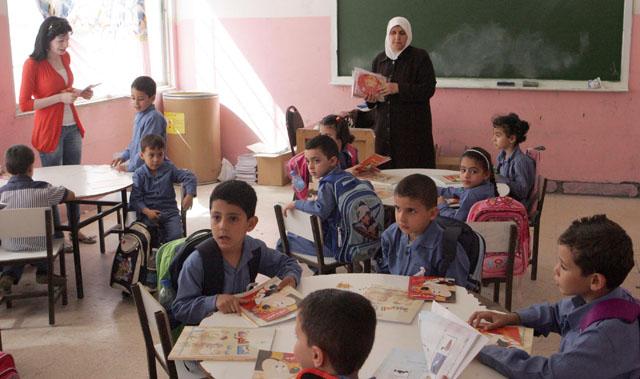You are here
Through early intervention project, educators explore innovative ways of teaching
By Laila Azzeh - May 04,2016 - Last updated at May 04,2016

Teachers receive training recently as part of the Early Grade Reading and Mathematics Initiative (Photo courtesy of RAMP)
AMMAN — An early educational intervention programme is changing teachers, students and parents’ attitudes towards learning.
“I can now engage more with my students and deliver the lesson in fun and insightful ways,” said Ilham Ayasrah, a first-grade teacher who is receiving training under the Early Grade Reading and Mathematics Initiative (RAMP).
For Fatima Zboun, the programme helped her explore new ways of teaching maths that have “helped even the weakest students perform better”.
“Mental calculation is one of the greatest concepts I have learnt through the initiative. I found it to be easier and motivating for students,” the first-grader teacher told The Jordan Times recently.
The USAID project, led by the Education Ministry and implemented by RTI International in partnership with other local and international organisers, targets students from KG2 to grade three.
RAMP seeks to transform the educational scene in two departments Jordanian students have proven to perform “very poorly” in — reading with comprehension and doing mathematics with understanding.
By 2019, around 55 per cent of early graders in public school will be able to master the two skills.
With the five-year programme aiming at targeting 400,000 students and 14,000 teachers at 2,500 government-run schools, a total of 2,500 teachers have been trained in the second phase of RAMP.
“One of the main aspect of the training is to support teachers inside classrooms and continue to follow up with them even after the training is over,” Manar Shukri, senior education specialist at USAID RAMP, told The Jordan Times.
Participating teachers will receive six in-class visits each semester from RAMP trainers.
“The visits are not meant to assess them, but to encourage them and see how they are managing as facilitators,” Shukri noted.
Maisoon Ghatasheh, one of the trainers from the Education Ministry, said field visits to teachers after the training are one of the “main reasons that are rendering the initiative successful”.
“I have been engaged in other training projects that did not bother to look back at the outcomes of the training afterwards,” she said, adding that teachers are also learning to effectively control the classroom.
RAMP works on achieving its goals through improving learning materials, preparing teachers to provide effective reading and mathematics instruction, engaging communities for participation in the education of students, and supporting the government in its endeavours to institutionalise early grade reading and mathematics policies.
Under the third phase, slated to start in August, the initiative will target teachers from Irbid, Amman, Aqaba and Tafileh.
According to the organisers, RAMP will also create communities of practices, communicating through a web-based community where teachers can access materials and watch videos of other educators implementing the various techniques.
A USAID-funded study
conducted in 2012 showed that the vast majority of early grade students were found to lack fundamental reading and mathematics skills.
The study also showed that only one in five second and third graders were reading with comprehension and that children were unable to perform basic mathematical functions with real understanding, depending instead on memorisation.
The findings of the study prompted the Education Ministry in cooperation with the USAID to carry out a one-year pilot programme that has managed to change the status quo in the schools it was applied in.
In only one year, the intervention project managed to double the number of children reading with comprehension and performing mathematics with understanding, according to the results of an assessment survey conducted to measure the outcomes of the programme.
The project significantly reduced the proportion of the lowest performers and increased the proportion of the highest performers among students in the targeted schools, USAID said at a ceremony to announce the results in 2014.
The number of students reading with comprehension increased from 12 per cent in 2012 to 24 per cent, while the number of students doing mathematics with understanding increased from 14 per cent to 24 per cent.
The outcomes of the intervention plan have inspired stakeholders to initiate RAMP, which was officially launched by Her Majesty Queen Rania last April.
Related Articles
AMMAN — By 2019, around 55 per cent of early graders in public school will be able to read with comprehension and do mathematics with unders
After the vast majority of early grade students were found to lack fundamental reading and mathematics skills in 2012, a one-year experimental programme has managed to change the status quo in the schools it was applied in.
AMMAN — Some 8,000 primary school teachers from across Jordan learned new methods to teach reading and maths over the summer, USAID said on
















